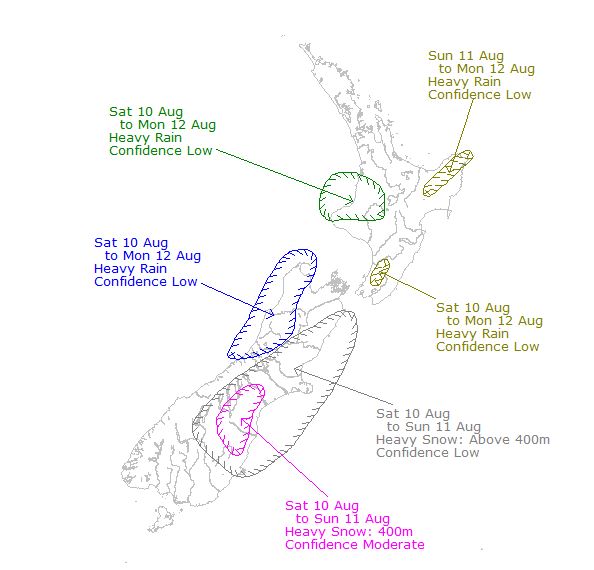The area covered by a MetService severe weather outlook for snow this weekend has now been extended to include Dunedin.
The MetService stressed there was some uncertainty about what severe weather a broad slow-moving front, predicted to move onto the country from the west, would bring, and reminded people to keep an eye on the forecast.
Initially the area covered by the severe weather outlook only included areas north of the Waitaki, but it has since been extended to include all of Otago except Clutha.
The MetService said it had a "low confidence" the front would bring heavy snow above 400m and flurries to low-levels for large parts of eastern Marlborough, Canterbury and Otago (except Clutha) on Saturday and Sunday.
In a separate update this afternoon, the MetService said the confidence increased to moderate for warning amounts of heavy snow above 400m for inland parts of Canterbury south of about Methven down to North Otago and northern parts of central Otago.
In addition, there would likely be strong to gale-force north to northwest winds in exposed parts of northern and central New Zealand on Saturday, Sunday and Monday, and also strong to gale force west-southwesterlies for coastal Southland and Otago on Monday, but at this stage the threat of severe gales was considered minimal.

Heavy rain was also possible in parts of the North Island and about the ranges of northwest Nelson, Buller and Westland north of Otira.
The severe weather outlook comes after there has been some disagreement over WeatherWatch's prediction of an "enormous storm" hitting the South next week.
Both Niwa and MetService said the prediction was premature, with a MetService forecaster saying the system was "quite typical" and a forecaster from Niwa saying the system would not bring the amount of snow which hit the South earlier this week.
WeatherWatch's Philip Duncan yesterday remained steadfast in his prediction and agreed that while it was winter and normal to get storms involving heavy rain and snow, this one was looking particularly nasty and people, particularly farmers, had a right to advanced knowledge.












